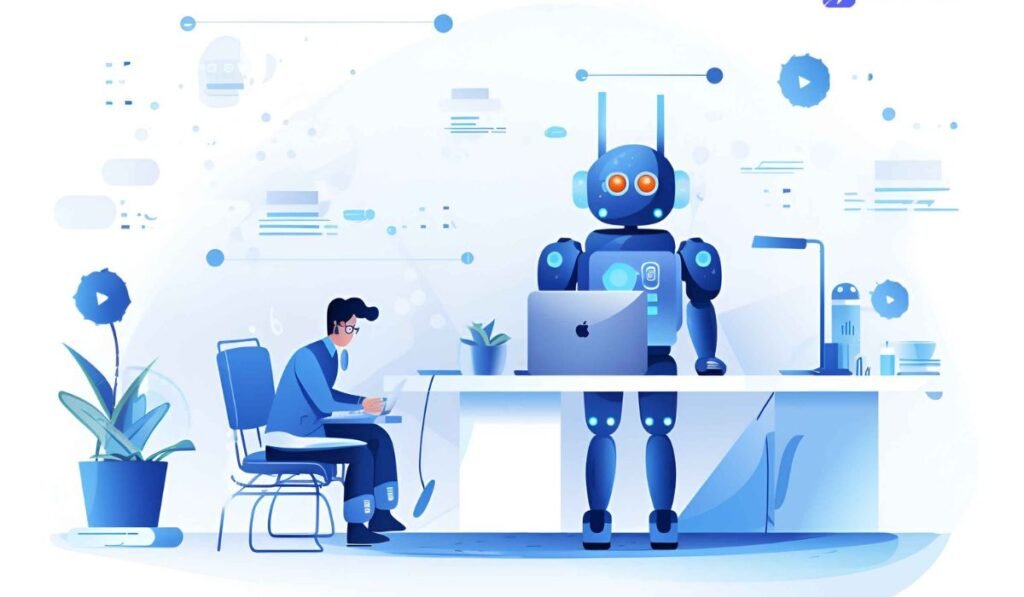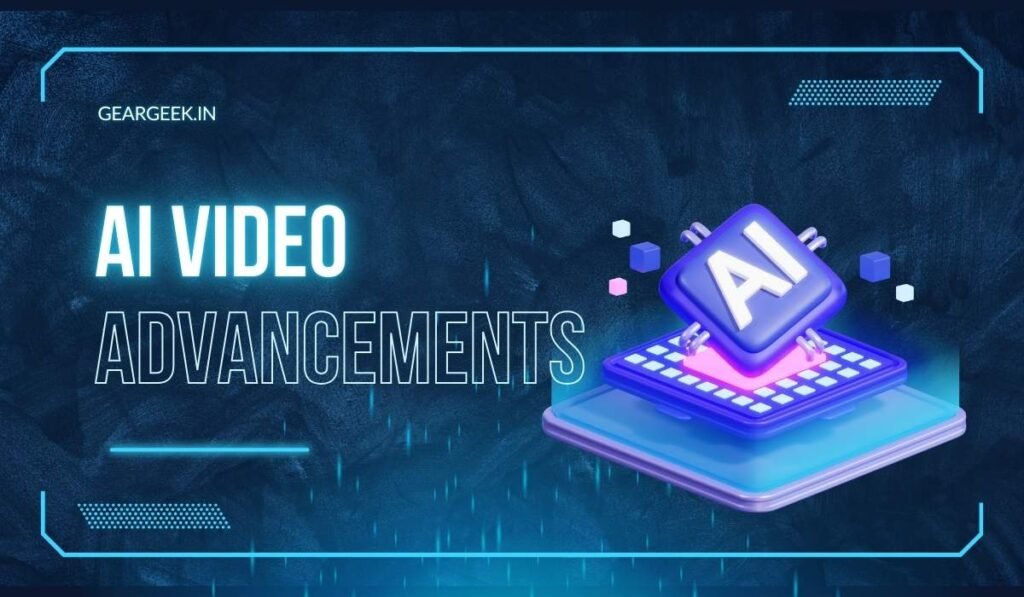In today’s rapidly evolving business landscape, AI in small business is no longer a futuristic concept—it’s a present-day reality transforming operations across industries. From personalized customer experiences to streamlined processes, artificial intelligence is opening doors for small businesses to compete on a larger scale. Imagine walking into your favorite coffee shop, and the barista greets you by name, remembers your usual order, and even asks about your kids. Now, picture offering that same level of personalized, memorable experience to all of your customers, all the time. With AI in small business, this scenario isn’t just a dream – it’s becoming increasingly achievable.
In this comprehensive guide, we’ll explore five practical applications of AI in small business that are changing the game for entrepreneurs worldwide. We’ll dive deep into real-world examples, discuss benefits and challenges, and provide actionable steps for implementation. Whether you’re new to AI or looking to enhance your current efforts, this article will serve as your roadmap to navigating the vast ocean of AI opportunities.
1. AI-Powered Concierge for Boutique Hotels
The Concept
Imagine a small chain or boutique hotel employing a conversational AI agent as their front desk. This AI concierge doesn’t just handle basic inquiries; it creates a personalized experience for each guest from the moment they interact with the hotel online.

How It Works
- Greets guests by name upon online interaction
- Provides detailed booking information and personalized recommendations
- Learns from past requests to tailor future experiences
- Suggests or books amenities based on previous preferences
- Addresses specific needs (e.g., extra pillows for neck issues)
Benefits and Challenges
Benefits:
- 24/7 availability without increased staffing costs
- Consistent quality of service
- Personalized experiences leading to higher customer satisfaction
- Improved efficiency in handling routine tasks
Challenges:
- Initial setup and integration with existing systems
- Ensuring the AI can handle complex or unusual requests
- Maintaining a balance between AI and human interaction
Getting Started
- Research AI chatbot platforms specializing in hospitality
- Gather and organize guest data from your current system
- Define the scope of tasks for your AI concierge
- Train the AI on your hotel’s specific offerings and policies
- Integrate the AI with your booking and CRM systems
- Conduct thorough testing before full implementation
- Train your staff on how to work alongside the AI system
Real-World Example
The Clarion Hotel in Stockholm implemented an AI concierge named Bebot. This AI assistant handles everything from room service requests to local restaurant recommendations, freeing up human staff to focus on more complex guest needs. The hotel reported a 60% increase in guest satisfaction scores within the first six months of implementation.
2. AI-Driven B2B Outreach
The Concept
In B2B outreach, personalization is key, and AI can be your ultimate tag team partner. AI-driven outreach combines data analysis, personalized content creation, and automated follow-ups to streamline the lead generation process.

How It Works
- AI scrapes the internet for insights on leads and their companies
- Crafts personalized messaging for cold email campaigns
- Initiates an ultra-personalized, realistic call upon form submission
- Conducts natural-sounding conversations equipped with sales information
Benefits and Challenges
Benefits:
- Highly personalized outreach at scale
- Improved lead quality and conversion rates
- Consistent follow-up without human error
- Data-driven insights for strategy refinement
Challenges:
- Ensuring AI-generated content maintains brand voice
- Navigating privacy concerns when scraping data
- Integrating AI systems with existing CRM and sales tools
Getting Started
- Choose an AI-powered sales automation platform
- Clean and organize your existing lead data
- Define your ideal customer profile for AI targeting
- Create templates and guidelines for AI-generated content
- Set up integration with your CRM and email systems
- Start with a small pilot program and analyze results
- Gradually scale up as you refine the process
Real-World Example
A small marketing agency, DigitalGenius, implemented an AI-driven outreach program that increased their qualified leads by 35% in the first quarter. The AI system not only personalized initial outreach but also handled follow-up communications, freeing up the sales team to focus on high-value prospects and closing deals.
3. AI-Enhanced Real Estate Services
The Concept
For realtors, efficient outreach and timely follow-ups can make or break a deal. AI can streamline onboarding, client management, and property matching, allowing realtors to focus on building relationships and closing sales.

How It Works
- Personalizes responses based on client preferences (e.g., big backyard, home office)
- Streamlines sharing of relevant listings
- Books appointments directly into the realtor’s calendar
- Sends text summaries of customer conversations to the realtor
- Notifies customers of upcoming appointments
Benefits and Challenges
Benefits:
- More efficient use of realtor’s time
- Improved matching of properties to client needs
- Faster response times to client inquiries
- Better tracking of client interactions and preferences
Challenges:
- Ensuring AI recommendations comply with fair housing laws
- Maintaining a personal touch in a tech-driven process
- Training AI to understand nuanced client preferences
Getting Started
- Select an AI-powered real estate CRM system
- Import your property listings and client database
- Set up AI preferences for property matching
- Create response templates for common client inquiries
- Integrate the AI system with your calendar and communication tools
- Train your team on how to use and supplement the AI system
- Regularly review AI performance and adjust as needed
Real-World Example
Redfin, while not a small business, provides an excellent example of AI in real estate. Their AI-powered Home Price Tool uses machine learning to predict home values with high accuracy. Small real estate agencies can implement similar, scaled-down versions to provide more accurate property valuations and better serve their clients.
4. AI-Powered Customer Support in Retail
The Concept
In the retail sector, AI can drive a customer support chat hotline connected to the company’s information database, providing instant, accurate responses to customer inquiries 24/7.
How It Works
- Instantly answers product feature questions
- Provides shipping and inventory information
- Handles complex inquiries like returns or billing details
- Escalates to human support when necessary
Benefits and Challenges
Benefits:
- 24/7 customer support without increased staffing costs
- Faster response times leading to improved customer satisfaction
- Consistent answers to common questions
- Frees up human agents to handle more complex issues
Challenges:
- Ensuring the AI can understand and respond to nuanced inquiries
- Maintaining a warm, brand-appropriate tone in AI interactions
- Seamlessly transitioning from AI to human support when needed
Getting Started
- Choose an AI chatbot platform with retail-specific features
- Compile a comprehensive FAQ database
- Integrate the AI system with your inventory and order management systems
- Create response templates that reflect your brand voice
- Set up escalation protocols for complex issues
- Train the AI on your specific products and policies
- Continuously monitor and improve AI responses based on customer feedback
Real-World Example
Lego implemented an AI chatbot named Ralph to handle customer service inquiries. Ralph can answer questions about products, shipping, and even suggest Lego sets based on customer preferences. Since implementation, Lego has seen a 50% reduction in call and email volume to their human customer service team.
5. AI-Assisted Marketing Campaigns
The Concept
AI can significantly enhance marketing efforts for small businesses by analyzing customer data, optimizing ad placements, and personalizing content at scale.
How It Works
- Analyzes customer data to create targeted marketing campaigns
- Optimizes ad placement and timing for maximum impact
- Generates personalized content for email marketing
- Predicts customer behavior to improve retention strategies
Benefits and Challenges
Benefits:
- More effective targeting of marketing efforts
- Improved ROI on advertising spend
- Personalized customer experiences at scale
- Data-driven insights for strategy refinement
Challenges:
- Ensuring data privacy and compliance with regulations
- Integrating AI tools with existing marketing platforms
- Balancing automation with creative human input
Getting Started
- Select an AI-powered marketing automation platform
- Consolidate your customer data from various sources
- Define clear goals for your AI-assisted marketing efforts
- Start with one channel (e.g., email marketing) and expand as you see results
- Create content templates that the AI can personalize
- Set up A/B testing to compare AI-driven campaigns with traditional methods
- Regularly review and refine your AI marketing strategies
Real-World Example
A small e-commerce business, The Kewl Shop, implemented an AI-powered email marketing system that analyzed customer purchase history and browsing behavior to send highly personalized product recommendations. This resulted in a 22% increase in email-driven sales within the first three months.
The Future of AI in Small Business
As AI technology continues to evolve, we can expect to see even more innovative applications for small businesses:
- Predictive Inventory Management: AI systems that can forecast demand and optimize stock levels.
- Voice-Activated Assistants: AI-powered voice assistants for hands-free operation of business systems.
- Autonomous Delivery: Small-scale autonomous vehicles for local deliveries.
- Emotion AI: Systems that can detect and respond to customer emotions in real-time.
- Augmented Reality (AR) Integration: AI-powered AR for virtual product try-ons or service demonstrations.
How to Start Implementing AI in Your Small Business
- Identify Pain Points: Analyze your business operations to find areas where AI could make the biggest impact.
- Set Clear Goals: Define specific, measurable objectives for your AI implementation.
- Start Small: Begin with a pilot project in one area of your business.
- Choose the Right Tools: Research and select AI tools that fit your specific needs and budget.
- Prepare Your Data: Organize and clean your existing data to ensure effective AI performance.
- Train Your Team: Educate your employees on how to work alongside AI systems.
- Monitor and Adjust: Continuously evaluate the performance of your AI implementations and make necessary adjustments.
- Scale Gradually: As you see success, gradually expand AI implementation to other areas of your business.
Measuring ROI of AI Implementation
To evaluate the success of your AI initiatives:
- Define Key Performance Indicators (KPIs): Such as customer satisfaction scores, response times, or conversion rates.
- Establish Baselines: Measure your KPIs before implementing AI to have a point of comparison.
- Track Direct Cost Savings: Calculate reductions in labor costs or operational expenses.
- Measure Productivity Improvements: Assess increases in output or efficiency.
- Monitor Revenue Impact: Track changes in sales or customer retention rates.
- Consider Intangible Benefits: Such as improved employee satisfaction or enhanced brand perception.
- Conduct Regular Reviews: Assess your AI implementation quarterly or bi-annually to ensure continued value.
FAQ: AI in Small Business
Is AI only for large corporations with big budgets?
No, many AI tools are now accessible and affordable for small businesses. Start with small, targeted implementations to see results without breaking the bank.
Will AI replace my employees?
AI is designed to augment human capabilities, not replace them. It handles repetitive tasks, freeing up your team to focus on more complex, creative work.
How long does it take to see results from AI implementation?
This varies depending on the application, but many businesses see initial results within 3-6 months of proper implementation.
Do I need technical expertise to implement AI in my business?
While some technical knowledge is helpful, many AI tools are designed to be user-friendly. You can start with plug-and-play solutions and gradually build your expertise.
How can I ensure my AI use is ethical and compliant with regulations?
Stay informed about AI ethics and data protection regulations. Be transparent with customers about AI use, and prioritize data security and privacy in all implementations.
AI in small business is not just a trend—it’s a transformative force that’s leveling the playing field and allowing small enterprises to compete with larger corporations. By embracing AI in areas like customer service, marketing, sales, and operations, small businesses can offer personalized experiences, streamline processes, and make data-driven decisions that drive growth.
Remember, implementing AI doesn’t have to be daunting. Start small, focus on areas where you can see immediate impact, and scale as you become more comfortable with the technology. The future of small business is here, and it’s powered by AI. Are you ready to take the leap?
AI can be applied in various ways, including AI-powered concierge services for hotels, AI-driven B2B outreach, AI-enhanced real estate services, AI-powered customer support in retail, and AI-assisted marketing campaigns.
AI can provide personalized interactions, remember customer preferences, and offer tailored recommendations, enhancing the overall customer experience and satisfaction.
Yes, many AI tools are now affordable and designed for small businesses. Companies can start with small, targeted implementations to manage costs while exploring AI capabilities.
AI is intended to augment human capabilities rather than replace them. It automates repetitive tasks, allowing employees to focus on more complex and creative work.
Challenges include the initial setup and integration with existing systems, maintaining a balance between AI and human interaction, and ensuring the AI can handle complex requests.
Results can vary, but many businesses report seeing initial outcomes within 3-6 months of implementing AI solutions effectively.
While some technical knowledge can be beneficial, many AI tools are designed to be user-friendly, allowing businesses to start with plug-and-play solutions.
Businesses should stay informed about AI ethics and data protection regulations, be transparent with customers about AI use, and prioritize data security and privacy.
The Clarion Hotel in Stockholm implemented an AI concierge named Bebot, which led to a 60% increase in guest satisfaction scores within six months.
Identify pain points, set clear goals, start with a pilot project, choose the right tools, prepare your data, train your team, and monitor performance for gradual scaling.


